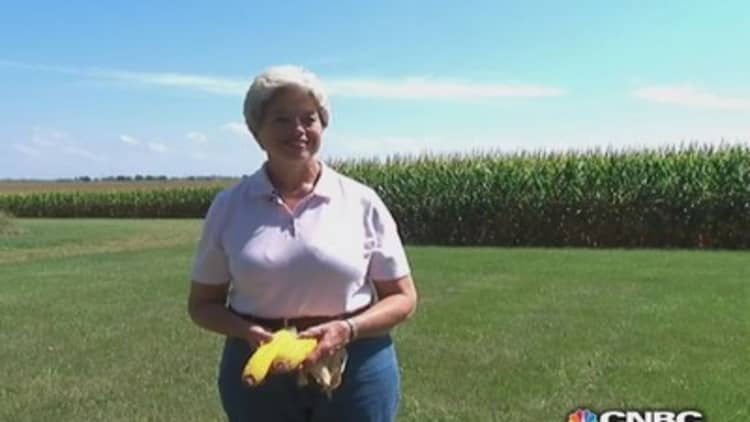California's drought is so so severe, says one water conservation group, that it's time to change the state's flag.
Instead of the lumbering bear walking on plush green grass, the California Water Foundation proposes a camel standing on sand. But all kidding aside, no one should be fooled by the tongue-in-cheek approach to the ongoing drought, said Andrew Fahlund, deputy director of CWF.
"The flag is jarring, and we meant it to be that way, and a reminder of how serious the situation is," he said.
Fahlund argued that the state's growing use of dwindling groundwater supplies is as severe as the drought itself.
"We depend on groundwater for about 40 percent of our needs in good years," he explained. "Now it's up to more than 60 percent because of the drought. We can't keep using it at that rate."
Read MoreDrought-shaming: There's an app for that
Just this past weekend, the state legislature voted to approve measures to regulate the pumping of groundwater. They are the first such rules in California's history. The bills target areas where groundwater wells are in danger of being overused.
The legislation gives local land planners two years to create a groundwater sustainability agency, which in turn has up to five years to develop a plan for managing wells and pumping. Those plans can include installing meters and charging fees to curb excessive use.
The measures go to Gov. Jerry Brown for his signature. He has 30 days to sign or veto them. Brown has yet to say what he will do.
Farmers: Don't 'monpolize' water
However, not everyone likes the proposed groundwater rules, especially some in the state's agricultural community—which accounts for about 80 percent of California's water use.
A statement from the president of the California Farm Bureau (CFB), Paul Wenger, said that while the group encourages the proper use of groundwater, "the legislature took the 'ready, fire, aim' approach, rushing these bills through and creating a massive new regulatory program in the final days of the legislative session."
"The bills would allow for groundwater to be monopolized to the detriment of urban water users and farmers—including people who have not created an overdraft problem but who could need access to groundwater in the future," Wenger said.

In addition, Wenger said the bills reach beyond efforts to balance inflows and outflows of groundwater basins, creating requirements that will lead to confusion and litigation.
Others say the regulations are long overdue.
"Establishing an effective legal framework for the management of surface and groundwater is the most basic step in any preparation to adapt to the climate change impacts we know will occur in California," said Michael Hanemann, a professor of environmental economics at the W.P Carey School of Business at Arizona State University.
California's drought, now in its third year, has dried up much of the state's surface water sources—which are expected to be reduced by about a third this year. That's forced more water to be pumped from groundwater wells for everyday uses such as drinking and farming.
The groundwater pumping has been so great that wells are running dry, and land is falling as water-drained soil collapses. That has led to billions of dollars in damage to roads, aqueducts, canals and pipelines.
And there are more fears of depleted groundwater in the years ahead, according to a report released this past July.
Read More Buzzkill: Drought saps California honey production
Without regulations in place, property owners in California currently can use all the groundwater they need, without facing any restrictions.
"Think of all users being able to use the equivalent of straws to extract from the large underground pool of water," said V. Kerry Smith, a professor of environmental economics at the W.P Carey School of Business at Arizona State University.
"Under those conditions, those with the largest straws get the most water regardless of how they intend to use the water," he said.
Support for bond issue
Besides the groundwater rules, California is tackling the water crisis with a state bond issue this November.
The $7.5 billion bond measure includes $2.7 billion for water storage projects. That money will be continuously appropriated—meaning that future legislatures will not be able to redirect it to other uses.
"It's a smaller (amount) than we'd like, but it's a step in the right direction," said CWF's Fahlund.
The bond issue appears to have more support than the groundwater rules do. The CFB has come out in support of it.
Bleak forecast
What will end the drought is rain and lots of it, say experts. But the forecast seems bleak.
Recent showers and thunderstorms in the Mojave Desert (southeastern California) led to a one-category improvement in an area of severe drought. But otherwise, conditions in California remain unchanged.
More than 95 percent of the state now falls under the "severe" drought category—the third harshest on a five-level scale.
—By CNBC's Mark Koba


